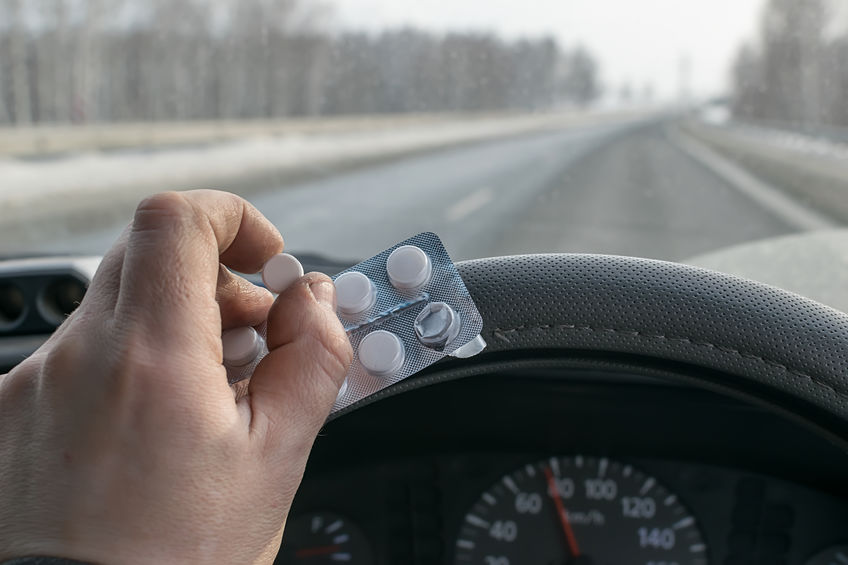Although drunk driving remains the No. 1 cause of highway deaths, drugged driving is an emerging and growing threat we cannot ignore. My 16-year-old daughter, Helen Marie, was killed by a teen driver impaired by both alcohol and marijuana – an especially dangerous combination. Impairment is impairment, and MADD is working to support victims of these crimes and fight for policies and technologies to make sure there are no more stories like Helen Marie’s. Helen Witty, MADD National President
 Mothers Against Drunk Driving (MADD) reports that drugged driving is a growing problem in the United States. It can come from illegal and legal substances, such as over-the-counter medications. MADD says 1 in 4 drivers tested positive for at least one drug that could affect safety.
Mothers Against Drunk Driving (MADD) reports that drugged driving is a growing problem in the United States. It can come from illegal and legal substances, such as over-the-counter medications. MADD says 1 in 4 drivers tested positive for at least one drug that could affect safety.
The U.S. Food and Drug Administration (FDA) recommends that drivers be sure they are taking medications that will not affect their ability to drive any vehicle, such as a car, bus, train, plane, or boat. Most medications don’t affect the ability to drive, but some prescriptions and over-the-counter medications can have side effects and cause reactions that may make it unsafe to drive, including:
- sleepiness/drowsiness
- blurred vision
- dizziness
- slowed movement
- fainting
- inability to focus or pay attention
- nausea
- excitability
The FDA wants potential drivers to know their medications and how they may affect the ability to drive. The following is a non-inclusive list of drugs that could make it dangerous to drive:
- opioid pain relievers
- prescription drugs for anxiety (for example, benzodiazepines)
- anti-seizure drugs (antiepileptic drugs)
- antipsychotic drugs
- some antidepressants
- products containing codeine
- some cold remedies and allergy products, such as antihistamines (both prescription and OTC)
- sleeping pills
- muscle relaxants
- medicines that treat or control symptoms of diarrhea
- medicines that treat or prevent symptoms of motion sickness
- diet pills, “stay awake” drugs, and other medications with stimulants (e.g., caffeine, ephedrine, pseudoephedrine)
The National Transportation Safety Board (NTSB) points out one of the difficulties in stopping drugged driving is properly identifying whether someone is under the influence of a dangerous substance while behind the wheel. The breathalyzer test which determines the percentage of a driver’s blood alcohol concentration (BAC) cannot determine a driver’s concentration of drugs, at the present time.
Fort Myers Accident Attorney Randall Spivey has many years of experience with DUI cases. He is dedicated to using all available Florida laws to obtain fair and just compensation on behalf of victims injured in drug-related accidents.
“Should you or a loved one be injured due to the negligence of another, please contact Spivey Law Firm, Personal Injury Attorneys, P.A. after seeking medical attention. We are available 24/7, and there are no costs or attorney fees until we receive a monetary recovery for you,” said Attorney Spivey.
Fort Myers Accident Attorney Randall L. Spivey is a Board Certified Trial Attorney – the highest recognition for competence bestowed by the Florida Bar and a distinction earned by just one percent (1%) of Florida attorneys. He has handled over 2,000 personal injury and wrongful death cases throughout Florida. For a free and confidential consultation to discuss your legal rights, contact Spivey Law Firm, Personal Injury Attorneys, P.A., in Lee County at 239.337.7483 or toll-free at 1.888.477.4839, or by email to Randall@SpiveyLaw.com. Visit SpiveyLaw.com for more information. You can contact Spivey Law Firm, Personal Injury Attorneys, P.A.in Charlotte County at 941.764.7748 and in Collier County at 239.793.7748.


